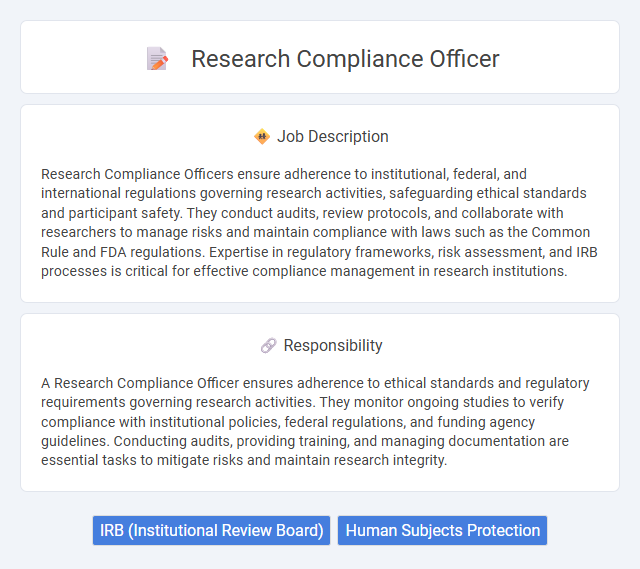
Research Compliance Officers ensure adherence to institutional, federal, and international regulations governing research activities, safeguarding ethical standards and participant safety. They conduct audits, review protocols, and collaborate with researchers to manage risks and maintain compliance with laws such as the Common Rule and FDA regulations. Expertise in regulatory frameworks, risk assessment, and IRB processes is critical for effective compliance management in research institutions.
Individuals with strong attention to detail, a firm understanding of regulatory requirements, and a commitment to ethical standards are likely to be well-suited for the role of a Research Compliance Officer. Those who thrive in structured environments and possess excellent communication skills may find this position fitting, as it involves ensuring adherence to protocols and facilitating collaboration among research teams. Conversely, people who prefer flexible or creative roles with less regulatory oversight might find this job less suitable for their strengths and preferences.
Qualification
Research Compliance Officers typically require a bachelor's degree in life sciences, health administration, or a related field, with many employers preferring candidates with a master's degree or certification in research compliance or regulatory affairs. Essential qualifications include comprehensive knowledge of federal, state, and institutional regulations governing human subjects research, such as the Common Rule, FDA regulations, and HIPAA. Strong analytical skills, attention to detail, and experience with institutional review board (IRB) processes are critical for ensuring adherence to ethical standards and legal requirements in research protocols.
Responsibility
A Research Compliance Officer ensures adherence to ethical standards and regulatory requirements governing research activities. They monitor ongoing studies to verify compliance with institutional policies, federal regulations, and funding agency guidelines. Conducting audits, providing training, and managing documentation are essential tasks to mitigate risks and maintain research integrity.
Benefit
Research Compliance Officer roles likely offer significant benefits including enhanced professional credibility and opportunities for career advancement within academic and clinical research environments. The position probably provides a unique chance to shape ethical standards and ensure regulatory adherence, contributing to the integrity of scientific investigations. Financial compensation and job stability could be favorable due to the specialized expertise required in navigating complex compliance frameworks.
Challenge
Research Compliance Officers likely face the challenge of navigating complex regulatory frameworks while ensuring ethical standards are met. The probability of encountering conflicting guidelines between institutional policies and federal regulations could complicate decision-making processes. Managing diverse stakeholder expectations while maintaining compliance accuracy may also present significant hurdles in this role.
Career Advancement
Research Compliance Officers play a crucial role in ensuring adherence to regulatory standards in clinical trials and academic research, making their expertise highly valued in healthcare, biotechnology, and pharmaceutical sectors. Career advancement opportunities often include senior compliance roles, regulatory affairs management, or consultancy positions that require in-depth knowledge of institutional review boards (IRB) and federal regulations such as HIPAA and FDA guidelines. Developing specialized skills in risk management, audit procedures, and data privacy enhances prospects for leadership roles and influence over organizational research policies.
Key Terms
IRB (Institutional Review Board)
Research Compliance Officers specializing in IRB oversee the ethical review process of human subjects research to ensure adherence to federal regulations and institutional policies. They coordinate protocol submissions, facilitate board meetings, and provide training on informed consent and risk management. Their role is critical in maintaining participant safety and upholding research integrity within academic and clinical settings.
Human Subjects Protection
Research Compliance Officers specializing in Human Subjects Protection ensure adherence to federal regulations such as the Common Rule and FDA guidelines to safeguard participant rights and welfare. They oversee Institutional Review Board (IRB) processes, conduct audits, and provide training on ethical standards and informed consent protocols. Their role is critical in maintaining compliance to prevent research misconduct and protect vulnerable populations in clinical and social science studies.
 kuljobs.com
kuljobs.com